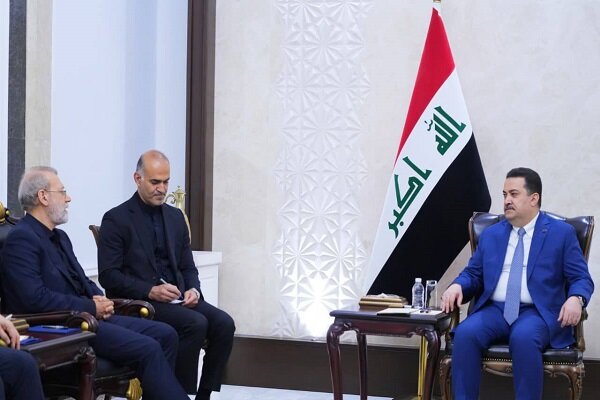Iran and Iraq: Strategic Allies and Pillars of Regional Stability and Security

Mehr News Agency, International Desk: The Islamic Republic of Iran continues to assert its influence in the region. Following the 12-day war, Iran’s regional power has not diminished; it has expanded. Iraq’s selection as the first foreign destination for Ali Larijani, the newly appointed Secretary of Iran’s Supreme National Security Council, highlights the importance Tehran places on bilateral relations. Similarly,Masoud Pezeshkian’s initial trip as Iran’s Vice President to baghdad underscores Iraq’s strategic priority for Iran.
Iraq has managed to overcome severe internal turmoil,occupation threats,terrorist attacks,and infrastructure challenges thanks to extensive Iranian support during its post-Saddam era. The Islamic Republic played a pivotal role in rescuing iraq from terrorist assaults and restoring national security. This backing elevated Iraq from a country dependent on aid into an critically important economic and security partner for Iran.Consequently, large-scale events such as the Arbaeen pilgrimage proceed smoothly under mutual security cooperation without obstacles while trade and transit flourish across all border crossings.
Together,Iran and Iraq serve as crucial pillars of regional security-not merely due to their 1,458-kilometer shared border but because two decades of collaboration have fostered deep mutual understanding aimed at protecting their interests. Their geographical position grants them notable influence over energy routes, trade corridors, supply chains-and they jointly control massive oil and gas reserves: Iraq in Basra and Kirkuk; iran in Khuzestan province and offshore fields.Coordinated energy policies between them could reshape OPEC dynamics and regional pricing strategies.
Agreements Focused on Mutual Security
Over recent years, expanding ties between Iran and Iraq have encompassed political, economic, social, and cultural domains. Beyond shared history, culture,and brotherhood among Muslim peoples of both countries lies another basic driver: safeguarding mutual security. A peak in this cooperation occurred with the March 19th 2023 agreement signed by then-Iranian Supreme National Security Council Secretary Ali Shamkhani and Iraqi National Security Advisor Qasim al-Araji.
A central aim of this agreement was preventing Iraqi territory-particularly Iraqi Kurdistan-from being used as a base by anti-Islamic Revolution opposition groups unfriendly toward Tehran. Political leaders alongside military forces took active roles ensuring implementation; consequently,next-generation opposition factions where removed from border areas facing Iran along with dismantling their camps.
This framework emphasized neutralizing armed separatist groups near western Iranian borders as an uncompromising red line for Tehran’s national security.That commitment extended further into joint coordination securing common borders,battling smuggling activities,fighting extremism,and thwarting cross-border attacks-forming pillars for ongoing collaboration.
The result is a shared understandingofsecurity imperatives.Underlining this,Qasim al-Araji publicly declared,”The securitiesofIranandIraqareintertwined.Consequently,Baghdadisintentoneffectivelyimplementingprevioussecurityagreementsandpreparedtoembracenewones.”Iraq’s Joint Operations spokesperson Tahseen al-Khafaji added,”Iraq remains fully committedtotheimplementationoftheagreement.Accordingly,takingnecessarymeasurespreventusingIraqigroundstoattackneighbors.”This pactrepresentsastrategicalignmentforthepreservationofregionalstability,bordersecurity,andterrorismcountermeasures.Asidefromoperationalchallenges,Iraqconsidersthiscooperationbothnecessaryandbeneficialforbothparties’ interests.”
An analysisoffieldevidenceconfirmshighlevelsofcompliancefromcentralIraagovernmenttowardagreementfulfillment,yetpracticalobstaclespersistespeciallyduetopoorcoordinationwithinKurdistanRegionalGovernmentOneoftheprimarycriticismsregardstheincompleteeffortdisarmingallhostilantgroupsoperatinginthebordersarea.ThisremainsanenforcementchallengeforTehran.Anadditionalcomplexityderivesfromdiscordamonginternalactors within Kurdistan Region hampering broader disarmament progress.
U.S Failure To Drive Wedge Between Tehran And Baghdad
During the past two decades,the IslamicRepublicmaintainedconstantcommunicationswithallMajorpoliticalFactionsofinIraq.Despiterepeated attemptsbytheUnitedStatestoemploydeceptionandrelianceondifferentmeanscepptISRETurn Iraqi politics executive agencies crow to distance themselves fromIran,thisstrategyhasfailedalkan many politicalcrisesinternally,Iraqi leadershaveinvitedIranianoofficialsactingasmediatorsandasreferees,giventheirbrotherlygoodfaithtowardsalltogrups.Increasingly,Iraqi diplomatic apparatus now servesasaregionallysignificantbridgeforsuch mediation extendingGeographic reach governmentofficediplomatic.inflareflectedacrossthePersianGulf,theArabLeague,andelsewhere.Ir traditionsrepresentbalancedaccurateappreciationofaIslamicRepublicforeignpolicygoals.Naturally,bothWashingtonandIsraelattempttocurtailthisdiplomatic&securitycollaborationbetweenTehranandBaghdad.Nevertheless,evidenceindicatesthatbothcapitalsremainvigilantagainstallowingenemiestakenadvantageofsuchtensionsoropportunitieswithinbilateralrelations.”


